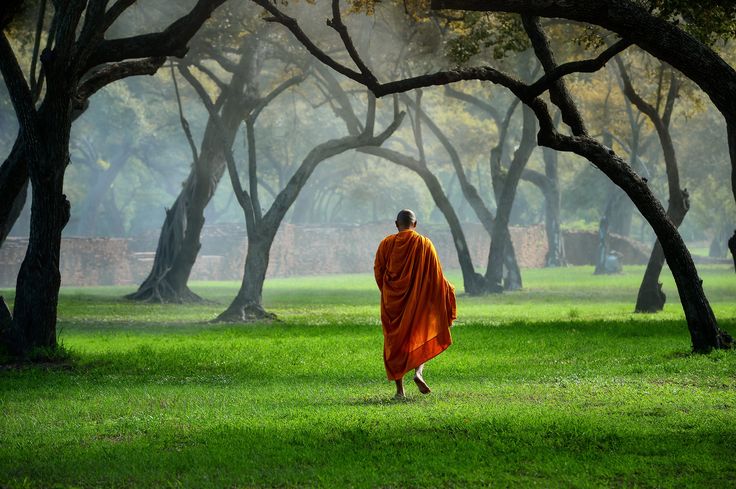by William Page
In Thailand they tell the tale of a resort town steeped in moral squalor and the Buddha who came to save it.
In olden times, Pattaya was a sleepy fishing village on the Gulf of Thailand. But over the years it became a beach resort, crowded with restaurants, hotels, night clubs, massage parlors, and bars. Prostitutes, pimps, and gangsters proliferated, attracted by hordes of tourists. The village whose name had once been synonymous with idyllic, palm-shaded tranquility was now a byword for self-indulgence and vice.
One day an ascetic came wandering up the road that ran along the beach. He was barefoot, wearing a patched, mud-brown robe, and he carried an alms-bowl made from an old yellow gourd. His age and nationality were hard to guess, although he looked vaguely Indian. But his skin was golden, and seemed almost to shine; his face was serene, his demeanor majestic.

He walked silently up the road. Everybody who saw him knew instinctively who he was. The shopkeepers, the vendors, the baht-bus drivers, the motorcycle thugs, the prostitutes, the transvestites, and especially the foreign tourists—everyone gathered on the sidewalks to stare at him as he passed by. And everyone, even the most hardened and cynical, was touched by the waves of bliss that flowed from him.
Some of the Thais approached him, prostrated themselves, and offered him flowers, garlands, fruit, food. He stopped, smiled, received each gift courteously, blessed each donor, and gently returned their offerings.
Soon his path was blocked by mobs of people, jostling and pushing to get a look. When they spoke to him in Thai, he merely smiled and shook his head. Some local monks joined the crowd and tried speaking to him in Pali, but his response was the same.
People kept trying to communicate with him in different languages—the locals in Thai, Mon, Lao, and Khmer, the tourists in English, Russian, German, and French. The monks kept asking him, in their best Pali, “What do you want? What should we do?”
To all of this he merely smiled, and the crowd became impatient. They began to wonder if they’d made a mistake. Maybe this wasn’t the Buddha; maybe he hadn’t come back to Earth. But the bliss he radiated affected every one of them.
Finally one venerable bhikkhu, one of the seniormost monks in the district, prostrated himself and asked what he wanted them to do. The anonymous ascetic turned and pointed to the road behind him.
And they noticed a trail of Buddha images lying behind him in the road. Wherever his foot had touched the ground, a Buddha image had sprung up—golden, the same color as his skin. Everyone rushed to pick up the images.
With the road before him thus unblocked, he proceeded serenely on his way, passing by the shops, the boutiques, the restaurants, hotels, discos, and go-go bars. With each step he took, another Buddha image fell from his foot and lay in the dust for somebody in the crowd to snatch up.
In this way he walked the entire length of Beach Road, followed by the growing crowds, who fought to pick up the images that dropped from his feet. When he reached a roundabout, he turned back to the crowds, raised his hand in blessing, and vanished in a flash of light.
Everyone who had picked up one of the Buddha images took it home. And then something strange happened.
In most cases, the golden color of the Buddha images began to fade. If its owner merely placed the image on an altar and paid perfunctory homage to it once or twice a day, the color faded fast. The image turned from gold, to mustard yellow, to tan, to brown, and finally to black. Eventually it turned to dried mud, then crumbled into dirt.
But this didn’t always happen. If a person spent a lot of time just sitting in front of the image, watching it, observing, the color stayed the same. Indeed, some of the monks, who started spending almost all their time that way, found that their Buddha images shone even more brightly than before.
Soon people came to realize that the brightness of one’s Buddha image depended on the amount of attention paid to it. And a new saying became popular: “Keep the Buddha in your mind, and you give him life. Shut him out, and you kill him.”
When they realized this, the people of Pattaya began to change. They spent more time in front of their Buddha images, just sitting and watching. And the images that had faded became brighter. The brighter they became, the less inclined the people felt to pursue money, to accumulate possessions, to seek pleasure. They got more joy out of sitting in front of their Buddha images, nourishing their minds with that ethereal brightness.
Then the economy of Pattaya started to die. The hotelkeepers and restauranteurs neglected their businesses; the bargirls and transvestites stopped reporting for work; the baht-bus drivers no longer cruised the streets looking for passengers. One by one, the night clubs, discos, and bars closed down, and the streets of Pattaya were empty. Everybody was at home sitting in front of a Buddha image on the altar.
The city fathers were frantic. They convened an urgent meeting. “Where is everybody?” the mayor demanded.
“At home, thinking about the Lord Buddha,” replied the city manager. He turned to the police chief. “You must do something,” he urged.
The police chief shrugged. “What do you want me to do?” he asked. “Arrest people for thinking about the Lord Buddha?”
“We must pass a law requiring people to go back to work,” declared the local godfather. “Otherwise we’ll shoot them.”
“You want to shoot everybody in town?” the city manager inquired.
“The tourists have stopped coming,” fretted the director of the local branch of the tourism authority. “There’s nothing for me to do here. They may transfer me to the provinces.” He shuddered at the thought.
“They may transfer all of us to the provinces,” sighed the police chief.
“I’d feel a lot better if we could shoot somebody,” grumbled the local godfather. “If this keeps up, Pattaya will go back to being a sleepy fishing village. The only people left in town will be fishermen and clamdiggers, and we’ll all starve.”
“Not to worry,” said the mayor. “I have faith in human nature. Let’s wait and see how things develop.”
His words proved prophetic. After a few days, with the stores shut down, the markets closed, and no vendors on the streets, people couldn’t get anything to eat. They soon ran out of food.
And other appetites began to stir. Little by little, people started coming out of their homes. A baht-bus driver summed up the mood of growing restlessness. “Bliss is boring,” he said. “I need a drink, and I feel an urgent need to shake down some tourists.”
“Ecstasy is enervating,” declared a go-go dancer. “I miss the bright lights and the thump of disco music. It’s time to party.”
“Thinking about the Lord Buddha is all very fine, but sometimes you need a little variety,” said a transvestite as he/she flounced toward the cabaret in a swirl of powder and perfume.
“Everything in moderation,” philosophized a policeman as he went off to collect bribes from the bars that were reopening. “You can’t sit in front of your altar forever. It is our duty to collect tea money, to prevent society from collapsing and maintain the integrity of the nation.”
Soon Pattaya was humming again. Everyone went back to work. The hustlers and prostitutes were out in force, the streets were packed with vendors and tourists, and ear-splitting music blared from every bar and disco.
And within a week, on all the altars all over town, the Buddha images crumbled into dust.
The local godfather sighed with relief. “After all, they were only images,” he said. “I have the highest respect for the Lord Buddha”—he bowed and brought his palms together piously in homage, his diamond pinkie-ring glittering in the light—“but we mustn’t let our devotion to him interfere with business.”
And he issued orders to his subordinates that if the anonymous ascetic in the mud-brown robe should ever show up again, they were to escort him politely out of town and send him on his way.
William Page has been associated with the Ramakrishna Vedanta Society of Massachusetts since 1960 and is a member of the Ramakrishna Vedanta Association of Thailand. He can be reached at wpage108@gmail.com.

Thank you for this tale! It is an eye opening story and made me laugh, cried and keep reading. I really feel that this is exactly what’s happening to our societies. We have to be more attentive to our ways and behaviors, and the consequences of our actions and the role we play in this realm of illusion. Our part in this complexity realm of desires, names and egos.